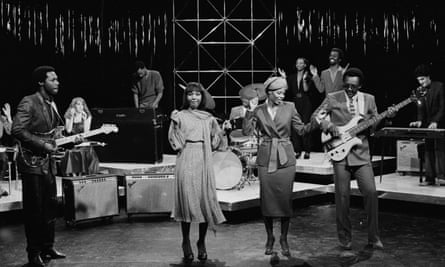Among the disco goddesses – the Donnas, Glorias, Evelyns, Gwens, Candis and Anitas – who serenaded the dancers of the hedonistic 1970s in such celebrated joints as New York’s Studio 54 and London’s Heaven, it seems likely that only Alfa Anderson’s destiny included leaving show business to resume her studies and eventually become a high school principal.
Anderson, who has died aged 78, had been one of the featured singers with Chic, the high-fashion disco ensemble whose chart-topping hits included Le Freak. Emerging from the ranks of backing singers in the Manhattan recording studios, she had been spotted by Luther Vandross, then a star-to-be, who introduced her in 1977 to the guitarist Nile Rodgers and the bassist Bernard Edwards, Chic’s ambitious young founders and songwriters.
The duo’s ambition was to create an upscale dance music blending funky dancefloor rhythms with the sophisticated style of an English band they much admired, Bryan Ferry’s Roxy Music. By comparison with their disco rivals, Chic were cool and restrained, their musicianship impeccable, their female singers conveying a matching sense of class.
On the sleeve of C’est Chic (1978), their second album, designed to look like the cover of a fashion magazine, it was Anderson who reclined in a white silk blouse and old-gold skirt against an expensive sofa in the garden room of a country house, while the other core members of the group struck suitably soigné poses. The message was unmissable: a dream of upward mobility which their audience was invited to share.
On another of their hits, I Want Your Love (like Le Freak, included in C’est Chic), Anderson took the solo lead, her voice finding a sinuous path between Edwards’s pulsing bass, Tony Thompson’s implacable drums, Rodgers’s flickering rhythm guitar, the cushion of strings, the syncopated trumpet figures and – in a typically imaginative touch – tubular bells prominently doubling the melody on the chorus.

The eldest of four children, Alfa Anderson was born in Augusta, Georgia, and named after the first letter of the Greek alphabet, its spelling varied to match the Christian name of her father, Alfonso Anderson, an employee of the US Postal Service. Her mother, Essie, was a social worker and Girl Scout troop leader.
Interested in music from a very early age, Alfa grew up singing in church and with the Girl Scouts, and learned the saxophone, flute and piccolo at Lucy C Laney high school. A degree in English at Paine College in Augusta was followed by a move to New York, where she settled in Harlem while studying for a master’s degree at the Teachers College at Columbia University and singing in the college choir.
She received her first significant public exposure through a role in Big Man, a play with music by the jazz saxophonist Julian “Cannonball” Adderley and based on the legend of the Black railroad worker John Henry. Attending its sole performance at Carnegie Hall in 1976, her churchgoing mother was shocked to discover her daughter singing the part of a “whore” called Maggie.
Her next professional appearance was at Lincoln Center, singing a solo piece called Children of the Fire, written by the trumpeter Hannibal Marvin Peterson as a protest against US involvement in the Vietnam war.
She also appeared on the soundtrack album of the hit musical The Wiz, produced by Quincy Jones.
In the daytime she was teaching at Hunter College, the public university on Park Avenue, New York, and music was still a part-time occupation when she met the founders of Chic. Arriving early at the studio to sing background parts on their first album, she was discovered marking her students’ papers while waiting for the session to start, much to the other musicians’ amusement.
When the lead singer, Norma Jean Wright, left in 1978 to pursue a solo career, Anderson was invited to take her place. Giving her notice to Hunter College, she shared the lead role first with Diva Gray on Le Freak, which became a Studio 54 anthem, and then on the road and in the studio with Luci Martin.
Most memorably, her voice was also featured on At Last I Am Free, a spellbinding ballad tucked away on C’est Chic. It caught the ear of the English rock musician Robert Wyatt, who released his characteristically plaintive version as a single in 1980.
After Chic disbanded in 1983, Anderson toured with Vandross, whose solo career had taken off. Her session work included a contribution to Bryan Ferry’s Slave to Love, a hit single also featuring Rodgers on guitar, its success boosted by its appearance in the 1986 film 9½ Weeks.
While with Vandross she met his bass guitarist, Eluriel “Tinker” (sometimes “Tinkr”) Barfield, who became her husband. Leaving the road and the studios in 1987, she went back to college, taking a second master’s degree, in educational leadership, at Bank Street College of Education, before joining the El Puente Academy for Peace and Justice in Brooklyn, first as a teacher and then as principal.
Although Chic later re-formed with other singers, there were occasional musical reunions with Norma Jean Wright and Luci Martin.
She and her husband also formed a group called Voices of Shalom, which released two albums of spiritual songs, Messages (1999) and Daily Bread (2005). Returning to secular music, in 2013 she released a single, Former First Lady of Chic, and in 2017 Barfield produced her solo album, Music from My Heart, featuring a song titled Perfectly Chic, which precisely recreated the sound of that most exquisite of disco ensembles.
She is survived by her husband and two stepsons.
Source: theguardian.com


